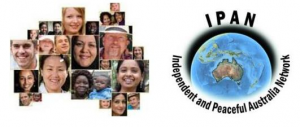The IPAN co-ordination committee and friends of IPAN met in Sydney on the weekend of 4-5th February to develop a strategy for implementing IPAN’s objectives in 2017 and beyond and plans for their implementation.
These plans and strategies were considered within the current political framework of the election of US President Donald Trump and the impact this election might have on Australia’s Foreign Policy and the US-Australia Alliance.
It was felt that the dangers of war and the opportunities for peace and independence both draw closer in 2017. How to avoid the former and advance the latter is our major challenge
Whilst there is still uncertainty about the directions Trump may take in international relations, the meeting identified two possibilities which would impact on Australia.
Firstly, Trump has stated that the allies of the US must take more responsibility including financial responsibility for their defence and not rely on the US. This dependency has been, of course, the central tenet of the foreign and defence policy embraced by successive Australian Governments and the major political parties since the Second World War. Many commentators are expressing concerns about Trump’s behaviour in the context of the Alliance. This political climate is favourable for IPAN and all organisations and individuals who are campaigning for a new direction and an independent direction, in foreign policy, to step up their campaigning.
Secondly, Trump and his key administrative appointments are expressing a belligerent attitude to countries such as China and Iran and appear to be prepared to act with force to achieve their political objectives. To demand, for example, that China must be denied access to the disputed islands in the South China Sea, forced to retreat to the Chinese mainland and let the US “rule the South China Seas”, is provocative to say the least and appears to accept that military hostilities would be an acceptable outcome of US demands. China is already modernising its nuclear weapons and delivery systems in response to Obama’s “pivot to Asia-Pacific”; this kind of provocation can only further intensify the dangers of escalation.
JUST REVEALED:
CIA KNEW 30 YEARS AGO PINE GAP WAS A HIGH-PRIORITY NUCLEAR TARGET
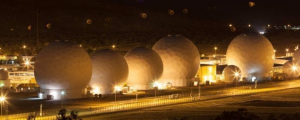
Top secret CIA document from the end of the Cold War shows just how likely it is that the Northern Territory’s Pine Gap joint spy base could be a target, a foreign policy expert has said.
The CIA this month put nearly a million historical documents online, and the 1980s document shows authorities expected the Pine Gap joint spy base near Alice Springs to be attacked in the event of a US-Soviet nuclear fight.
A 1987 briefing, marked “top secret”, refers to a draft Australian defence white paper given to the US that conceded Pine Gap “would be attacked” if the US and the Soviet Union had a nuclear fight.
But Australia’s final white paper that year used different wording. It said in the event of such a remote chance of nuclear conflict, there was a “risk” the spy base “might” be attacked.
A top secret CIA document from the end of the Cold War shows just how likely it is that the Northern Territory’s Pine Gap joint spy base could be a target, a foreign policy expert has said.
The CIA this month put nearly a million historical documents online, and the 1980s document shows authorities expected the Pine Gap joint spy base near Alice Springs to be attacked in the event of a US-Soviet nuclear fight.
A 1987 briefing, marked “top secret”, refers to a draft Australian defence white paper given to the US that conceded Pine Gap “would be attacked” if the US and the Soviet Union had a nuclear fight.
But Australia’s final white paper that year used different wording.
It said in the event of such a remote chance of nuclear conflict, there was a “risk” the spy base “might” be attacked.
Pine Gap still high-priority target: expert
The University of Melbourne’s Professor Richard Tanter said the risks Pine Gap represented were as great as ever, and that the Defence Department remained internally concerned the base was a high-priority nuclear target.
Professor Tanter, also a senior researcher at the Nautilus Institute for Security and Sustainability, said a country such as China could not yet reach Pine Gap with conventionally armed missiles.
“It does, however, have more than one set of land-based missiles, which could certainly reach Pine Gap as well as submarine-launch missiles,” he said.
“So, an attack on Pine Gap would have to be effectively a missile attack with a nuclear-armed missile.”
Professor Tanter said the difference in language between the Australian and US briefings from 1987 was revealing and said there needed to be an “informed debate” about Pine Gap, to allow the public to make up its own mind.
“But we need to have it done on the basis that the government is telling the truth about what it knows on such a really serious issue.”
He said he expected Australians would begin to rethink ties to America in light of Donald Trump taking the reins.
“I’ve no doubt that many Australians are going to be asking in the months to come, whether it’s wise that we allow ourselves to be so automatically tied to American foreign policy,” he said
Australia must join the UN negotiations to prohibit nuclear weapons!Dear Supporters,
At a time of great global instability and tension, it’s more important than ever to support efforts to eliminate the nuclear threat. Next month, negotiations will begin at the United Nations on a treaty outlawing nuclear weapons.
The United States, which possesses approximately 6,800 nuclear weapons, has voiced its strong opposition to these negotiations. It’s urging allies, including Australia, not to participate.
But Australia, as a sovereign nation, should decide for itself whether to join this historic process. The government should listen to its people, not take orders from the Trump administration.
Here are two important ways that you can put pressure on the Australian government to participate:
SIGN OUR
PETITION TO THE FOREIGN MINISTER:
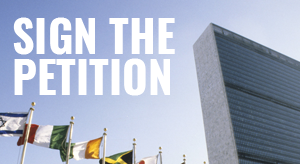
CALL THE FOREIGN MINISTER’S OFFICE:
Hon Julie Bishop MP, Foreign Minister
(02) 6277 7500 (Canberra)
(08) 9388 0288 (Perth)
Ask whether Australia will participate in the UN negotiations on a treaty to prohibit nuclear weapons, which are set begin on 27 March. Explain why you believe it’s so crucial that we take part.
Australia has joined treaties banning chemical weapons, biological weapons, anti-personnel landmines and cluster munitions. Now it must help negotiate a ban on nuclear weapons.
Yesterday 21 Nobel peace prize winners, including the Dalai Lama and former Soviet leader Mikhail Gorbachev, urged governments to join the negotiations. Australia must heed their call!
With Donald Trump in power, Australia urgently needs to re-evaluate its US bases
Margaret Beavis
(Letter to the Editor published in
Sydney Morning Herald)
Recent changes to the US National Security Council should be ringing loud alarm bells in Canberra.
By demoting the highest-ranking military officer and the highest-ranking intelligence officer, and appointing political adviser Stephen Bannon as a permanent member of the NSC, Donald Trump has seriously escalated the risk of the US launching into ill-advised conflicts. Bannon comes from a role as chairman of the racist, Islamophobic website Breitbart.com, and is reported as having been in charge of writing the recent executive order that has banned US entry for refugees and citizens from seven Muslim-majority nations.
It is no secret that Australian foreign policy and defence forces are closely enmeshed with the US. Since Trump has taken office he has loudly proclaimed an “America first” foreign policy, and his Secretary of State, Rex Tillerson, talks of denying China access to artificial islands in the South China Sea. Any such blockade is likely to be seen by the Chinese as an act of war.
Malcolm Turnbull’s meek response to the immigration executive order does not inspire confidence that he will stand up to the US.
Historically Australia’s foreign policy has also leaned towards “America first”, with little differentiation between our ally’s interests and our own. In rushing to join the coalition going into Iraq, the thought that Australia may be better off not invading another country on the basis of dubious intelligence was overlooked. Indeed, in the Vietnam War, the CIA knew the war was unwinnable, even before Australia sent troops. Malcolm Fraser, defence minister at the time, was livid when he discovered this many years later. A total of 521 Australian troops died in Vietnam and about 3000 were wounded.
Since World War II, Australia has joined in more US wars than any other ally. With Canberra’s current “business as usual” agenda, Australia is at high-risk of joining future US wars that will likely create further humanitarian disasters and undermine our security.
Simultaneously there is talk of expanding US bases in the region. What is Australia going to say when the US asks to increase its bases on our soil? Are we willing to make Australia a target? CIA documents from the 1980s released this month revealed authorities expected the Pine Gap spy base near Alice Springs to be attacked in the event of a US-Soviet nuclear fight.
Australia has US marines based in Darwin, multiple surveillance bases and about 40 senior Australian Army officers working in US Pacific Command. This includes an Australian Army Major-General serving as the deputy commanding general – operations, US Army Pacific. This intense enmeshment reinforces Australia’s past behaviour; when the US goes to war, we have little option but to follow. With the US building up its military bases around China, American threats of blockades in the South China Sea are reckless and provocative. A war between China and the US is not in Australia’s interests or anyone’s interests.
Another example of US influence has been Australia’s behaviour at recent UN talks regarding the nuclear weapons ban treaty. Australia has acted as US proxy in trying to thwart these negotiations. So much so that the Australian delegation was dubbed the chief of the “weasel states”. Despite Australia’s efforts, negotiations for a treaty will go ahead this year. Australia has not committed to participating, which calls into question our government’s commitment to the UN.
Australia urgently needs to re-evaluate its American bases and promote steps that defuse rather than intensify regional tensions. Having senior Australian defence personnel integrated into the US defence force hinders Australia acting independently. Do we want Australia to be capable of making strategic decisions in the national interest? New Zealand clearly acts in its own interest and remains an ally.
With Trump now the new US Commander-in-Chief, is it wise that we allow ourselves to be so automatically tied to American foreign policy? War in our region would be a humanitarian catastrophe for all involved.
Margaret Beavis is a Melbourne GP and president of the Medical Association for Prevention of War.
Nonviolent Action: Why and How it Works
By Robert J. Burrowes
January 25, 2017 “
Information Clearing House” –
Nonviolent action is extremely powerful.
Unfortunately, however, activists do not always understand why nonviolence is so powerful and they design ‘direct actions’ that are virtually powerless.
READ ONUS military Increases Darwin Marine Base Build-up
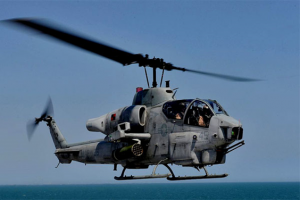
Ostensibly a part of troop rotation (as the ABC notes), the latest US aircraft deployment to Darwin in fact triples the size of the previous contingents in 2015 and 2016, and by their own admission, increases their capacity.
READ ONNew Zealand spy base works for Donald Trump now protesters say
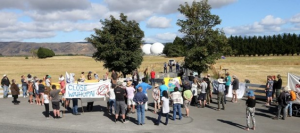
Protesters are calling for the closure of Marlborough’s Waihopai spy base for a new reason this year- they don’t want United States President Donald Trump getting information out of New Zealand.
The annual protest outside Waihopai Station, west of Blenheim, focused on the new American president with protesters concerned about what Trump might do with the information the base collected.
Anti Bases Campaign organiser Murray Horton said whistle-blower EWdward Snowden had proved the spy base collected phone and internet data from New Zealand and south Pacific countries for US National Security Agency
READ ON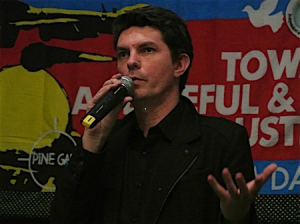
One White House phone call and Australia is at war:
-Scott Ludlam on re-introduction of the War Powers Reform Bill
The Australian Greens have reintroduced the ‘war powers’ bill, which would require Parliamentary approval before Australian forces are sent to war.
“When the war powers bill came before parliament in the past, we used Prime Minister Howard’s captain’s call on the illegal invasion of Iraq as Exhibit A to justify the urgency of the bill. The notion of an unstable American President recklessly picking up the phone to demand a commitment of Australian forces was a hypothetical nightmare scenario. Now it’s a terrifying likelihood,” said Australian Greens Co-Deputy Leader and Defence spokesperson Senator Scott Ludlam said today.
“The new U.S. Administration is not yet a month old, and we’ve already seen Donald Trump’s willingness to berate Prime Minister Turnbull, a man who can’t even stand up to his own conservative colleagues.
“Right now, a well-practiced Prime Ministerial capitulation, on the back of 140 characters of Presidential unhinging, is all it will take to send Australian servicemen and women to their deaths.
“The United States, which requires congressional approval before sending troops to war, currently has more protection from impetuous actions of their President than Australia does.
“Other democracies, including Denmark, Finland, Germany, Ireland, Slovakia, South Korea, Spain, Sweden, Switzerland and Turkey, set down troop deployment in constitutional or legislative provisions. Parliamentary approval or consultation is also routinely undertaken in Austria, the Czech Republic, Italy, Japan, Luxembourg, the Netherlands and Norway.
“In 2013 the UK avoided deep embroilment in the disastrous conflict in Syria thanks to the House of Commons saving David Cameron from himself.
“It’s a long overdue reform, and a much-needed first step in rethinking our relationship with the United States under Donald Trump,” Senator Ludlam said.
Defence worker states There is no need for extra spending on submarines or air warfare destroyers
An article in this weekend Saturday Paper is worth reading – the 2016 White Paper says that Australia now has an adequate defence capability. The author Mike Gilligan was a Defence Dept worker for 20 years concentrating on defence capability. He argues that in view of Australia’s current adequate defence capability,there is no need for extra spending on submarines or air warfare destroyers. Also no need for ANZUS.
Read onThe Coming War On China
The Coming War on China is John Pilger’s 60th film for ITV. Pilger reveals what the news doesn’t – that the world’s greatest military power, the United States, and the world’s second economic power, China, both nuclear-armed, are on the road to war. Pilger’s film is a warning and an inspiring story of resistance.
Showings Upcoming Events
Brisbane IPAN Groups Planning Meeting for 201820 Jan 12:00 PM - 3:00 PM AEDT
ACT IPAN planning meeting, 23 January23 Jan 4:30 PM - 6:00 PM AEDT
Don’t miss the Peace Boat visiting a port near you! 25 Jan – 5th February 201825 Jan 8:00 AM - 5 Feb 8:00 PM AEDT
Poetry of Palestine – Adelaide, Wed 31 January 201831 Jan 6:00 PM - 9:00 PM AEDT
Making Waves – Peace boat in Sydney 5 February 20185 Feb 6:00 PM - 8:00 PM AEDT
View All EventsRecent Posts
Amid fears of an escalating nuclear threat, the media is failing in its duty – 16 Jan 2018New York City to Divest from Fossil Fuels – Guardian 12 Jan 2018Largest Dutch pension fund to divest from nuclear weapons – 11 Jan 2018War on the cheap, Alison Broinowski, 6 January 2018IPAN questions $10.3 billion of Australian tax dollars going to US arms manufacturers – 28 Dec 2017